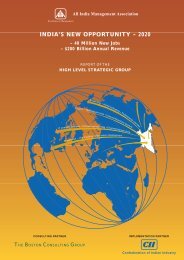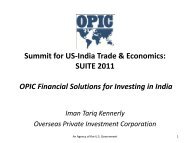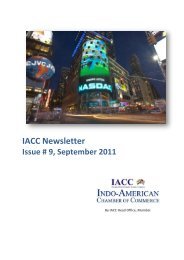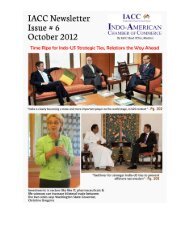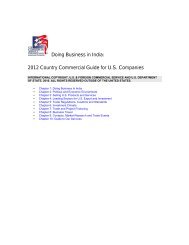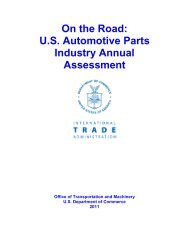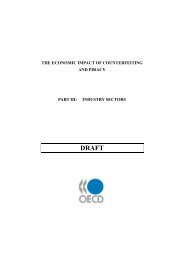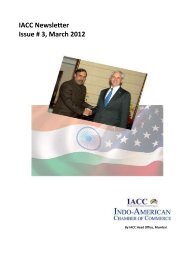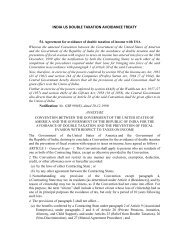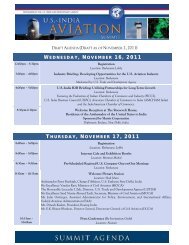Download the PDF version here - Indo-American Chamber Of ...
Download the PDF version here - Indo-American Chamber Of ...
Download the PDF version here - Indo-American Chamber Of ...
Create successful ePaper yourself
Turn your PDF publications into a flip-book with our unique Google optimized e-Paper software.
Chaudhry, who started his career with <strong>the</strong> state-run trading firm State Trading Corp., joined Cargill in<br />
1995 and held several leadership positions in India after serving five years at Cargill in Geneva in <strong>the</strong><br />
company founded in 1865. Edited excerpts:<br />
Internationally Cargill is known as a food company, but in India you are primarily known as a trading<br />
outfit. Why is it so? And is this likely to change in <strong>the</strong> future?<br />
In India, we are actually a food company. We originally have been supplying or buying commodities from<br />
India or into India. This was in <strong>the</strong> 1970s when India had a deficit in sugar and o<strong>the</strong>r commodities. Over<br />
<strong>the</strong> years, we have evolved. We have gone into manufacturing and we have a reasonably sized asset<br />
based <strong>here</strong>. Today we have three world-class edible oil refineries. We have plants for manufacturing<br />
animal feeds, animal pre-mixes and we have a sugar refinery in a joint venture. We have some of <strong>the</strong><br />
leading edible oil brands. We have distribution and marketing for animal feeds and pre-mixes. And we<br />
are into trading, of course, in commodities such as sugar, cotton and some o<strong>the</strong>r grains.<br />
We manage supply chains. We manage <strong>the</strong> twice-a-year harvest but (also) a round-<strong>the</strong>-year need from<br />
consumers by coming in <strong>the</strong> middle between <strong>the</strong> farmer and <strong>the</strong> producer of food to link commodities<br />
to <strong>the</strong> end users.<br />
Give us a sense of your size. How much of revenue do<br />
you get in a year and if you could compare with 25 years<br />
ago, how much have you grown by?<br />
Revenue is important; but in a commodity organization,<br />
w<strong>here</strong> <strong>the</strong> price of <strong>the</strong> commodity has a big role in<br />
defining <strong>the</strong> size of <strong>the</strong> revenue, it is not <strong>the</strong> sole indicator<br />
of growth. Out of <strong>the</strong> $119 billion of <strong>the</strong> Cargill global<br />
turnover in 2010-11 (ended in May 2011), $3.5 billion was<br />
linked to business (in) India.<br />
In edible oils, we have 15% of <strong>the</strong> branded retail market in<br />
a business w<strong>here</strong> <strong>the</strong> organized brands form 25% of all of<br />
<strong>the</strong> oils consumed. This means we sell about 600,000 tons<br />
of edible oils, most of which is imported.<br />
What is on your agenda for <strong>the</strong> next few years?<br />
We are in <strong>the</strong> food and agriculture space, which is relevant<br />
today and is expected to stay so. We have <strong>the</strong> global<br />
w<strong>here</strong>withal, access to best practices and experiences,<br />
technology and we have, over <strong>the</strong> years, built <strong>the</strong>se<br />
linkages in <strong>the</strong> Indian market. We do have <strong>the</strong> potential to<br />
bring in a lot of products, to create products, to help our<br />
customers create products which are going to be <strong>the</strong> need<br />
of <strong>the</strong> consumer. And this could be across <strong>the</strong> food basket.<br />
What kind of business expansion are you looking at?<br />
For example, we buy corn from farmers and export it. Going forward, we could get into wet milling,<br />
w<strong>here</strong> we could be producing starch and glucose from corn. That evolution we’ve seen and experienced



